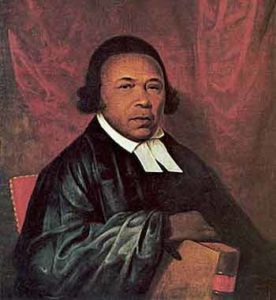
Absalom Jonesby Raphaelle Peale
On this date, in 1746, we mark the birth of Absalom Jones, a Black minister and abolitionist.
A house slave from Delaware, Jones taught himself to read out of the New Testament and other books. At 16, he was sold to a store owner in Philadelphia and soon attended a night school for Blacks operated by Quakers. In 1766, he married another slave and purchased her freedom with his earnings, buying his freedom in 1784.
At St. George’s Methodist Episcopal Church, Jones served as a lay minister for its Black membership. The active evangelism of Jones and his friend, Richard Allen, greatly increased Black membership at St. George’s. This alarmed the vestry into segregating blacks into an upstairs gallery without notifying them. During a Sunday service, when ushers attempted to remove them, the Black congregation resentfully walked out as a group.
In 1787, Black Christians organized the Free African Society, the first organized Afro American society. Absalom Jones and Richard Allen were elected overseers. Members paid monthly dues to benefit those in need. The Society established contact with similar Black groups in other cities.
Five years later, the Society began to build a church dedicated to July 17, 1794. The African Church applied for membership in the Episcopal Diocese of Pennsylvania on the following conditions: 1, that they are received as an organized body; 2, that they have control over their local affairs; 3, that Absalom Jones be licensed as a lay reader, and, if qualified, be ordained as a minister. In October 1794, it was admitted as St. Thomas African Episcopal Church. Bishop White ordained Jones as a deacon in 1795 and as a priest on September 21, 1802.
Jones was a deep preacher. He denounced slavery and warned the oppressors to “clean their hands of slaves.” To him, God was the Father who always acted on “behalf of the oppressed and distressed.” But it was his constant visiting and mild manner that made him beloved by his congregation and by the community. St. Thomas Church grew to over 500 members during its first year. Known as “the black Bishop of the Episcopal Church,” Jones was an example of persistent faith in God and the Church as God’s instrument. He died in 1818.
An Encyclopedia of African American Christian Heritage
by Marvin Andrew McMickle
Judson Press, Copyright 2002
ISBN 0-817014-02-0